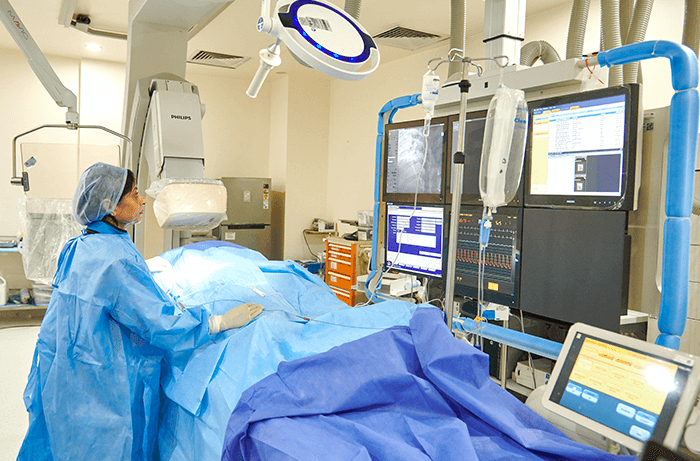×
Select Your Country
 International
International

×
Select Your Country
 International
International


PCI is a minimally invasive procedure performed for opening blocked coronary arteries to allow unobstructed flow of blood to the heart. This procedure is conducted under local anaesthesia and employs the use of X-rays to assist the cardiologist in viewing the site of the blocked artery. The test involves the insertion of an intravenous (IV) line in the arm and the administration of sedating medication. This is followed by a small needle puncture on the groin or hand to place a sheath, after which, a PTCA wire and guiding catheter are guided towards the site of the blockage with the help of a balloon. After this, the balloon will be inflated and deflated several times by the cardiologist to compress the plaque and open up the artery.
Why Manipal?
At Manipal Hospitals, our cardiologists are exhaustively trained in performing multiple types of cardiac procedures successfully. Our doctors are highly experienced in manoeuvring balloons and stents, which helps them set benchmarks in cardiac treatment. We prioritize the safety and comfort of each patient and always strive to provide comprehensive cardiac treatments and services.
Solutions in PCI
PCI is a non-surgical procedure and it is performed to eliminate the obstruction of blood flow in the arteries. Balloons, Atherectomy devices, and stents are used in this type of angioplasty for clearing the arteries. This is achieved by placing a tiny tube or balloon catheter into the blocked artery through the wrist or the groin. The balloon is then inflated to enlarge the narrowing artery to facilitate the uninhibited flow of blood. Apart from relieving angina or chest pain, the procedure can also stop or mitigate the chances of heart attacks so that the patient doesn’t have to undergo a bypass surgery later.
Risks
While the PCI is a safe procedure for clearing blocked arteries, it may not prevent the re-narrowing of the artery in some rare cases. Moreover, blood clots may form in stents even after the procedure, or in some cases, patients may report bleeding. However, at Manipal Hospitals, such cases are unheard of as our cardiac specialists are proficient in conducting routine diagnostic angiographic and cardiac catheterization procedures. Moreover, they conduct prior tests to prevent complications and mitigate risks.
Success of PCI
PCI has quickly emerged as the most reliable therapeutic procedure for patients with coronary artery disease. As per statistics, 95% of all PCI procedures are successful and the rest have recurrences of blocked arteries because of several factors. At present, the recurrent rate after a stent is 10%.
Infection Control Protocol
At Manipal Hospitals, we follow a strict infection control protocol that ensures the safety of every patient from infections. Post the completion of the PCI procedure, which usually lasts for 30-60 minutes, patients are kept under observation. On the basis of the condition of the stabilised artery, the catheters are removed after 4-12 hours. Patients are generally discharged the day after the procedure.